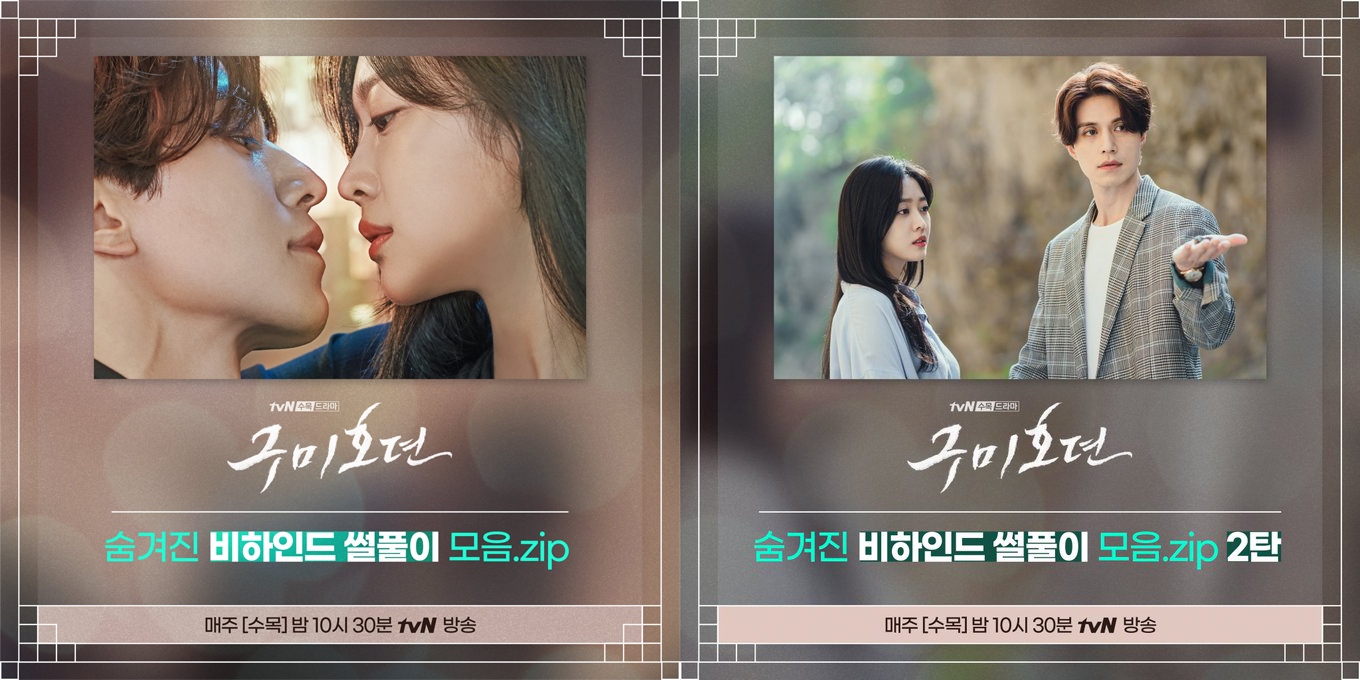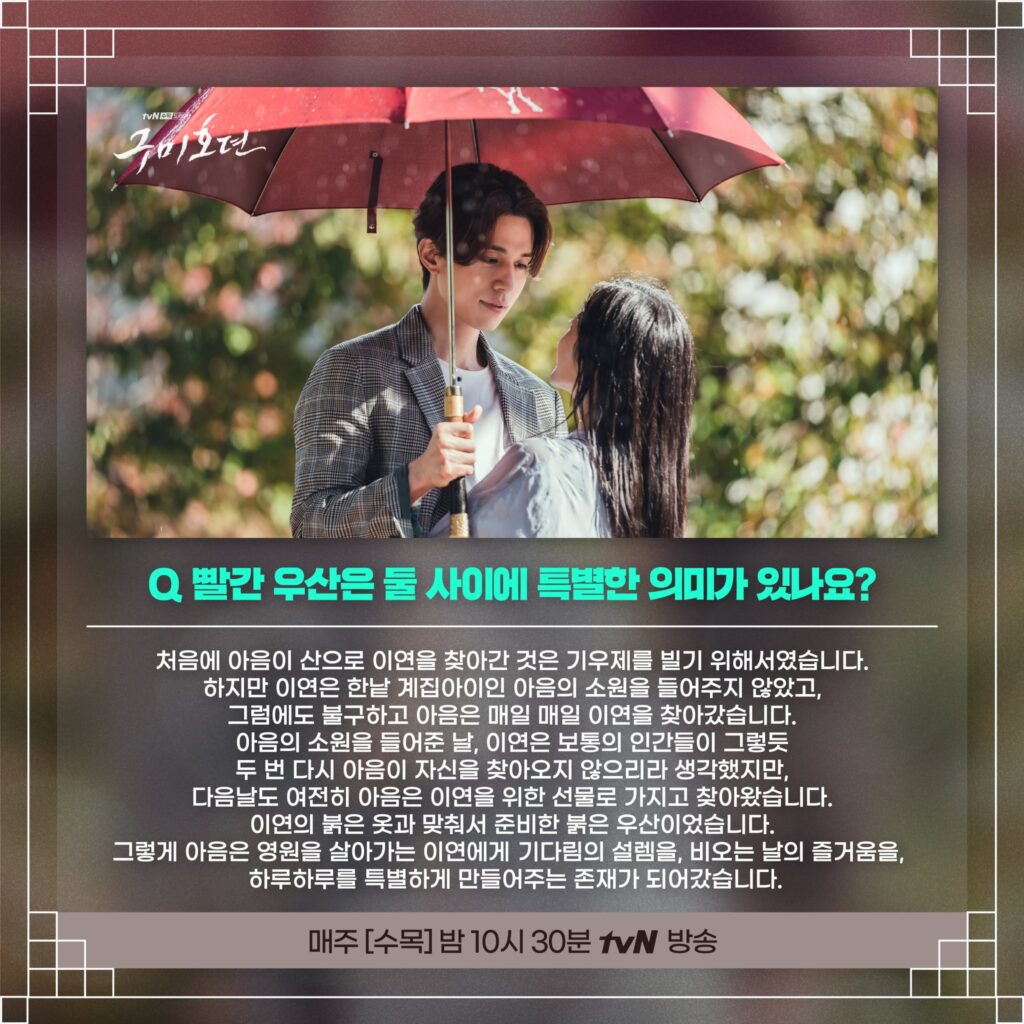
Q: Does the red umbrella have special meaning to Lee Yeon and Ah Eum/Ji Ah?
The first time Ah Eum went to the mountain to seek out Lee Yeon was to pray for rain. Lee Yeon, however, did not grant Ah Eum’s wish, as she was nothing but a small girl. Despite this, Ah Eum continued to visit Yeon day after day. On the day he finally granted her wish, Lee Yeon thought that Ah Eum, like other humans, would never again seek him out now that her wish had been fulfilled. However, the next day, Ah Eum came as usual, this time with a present for Yeon. It was a red umbrella she had selected to match his red clothes. Thus, Ah Eum taught Lee Yeon, who lives eternally, the anticipation of waiting and the joy of rainy days, and became a presence who made each day special.
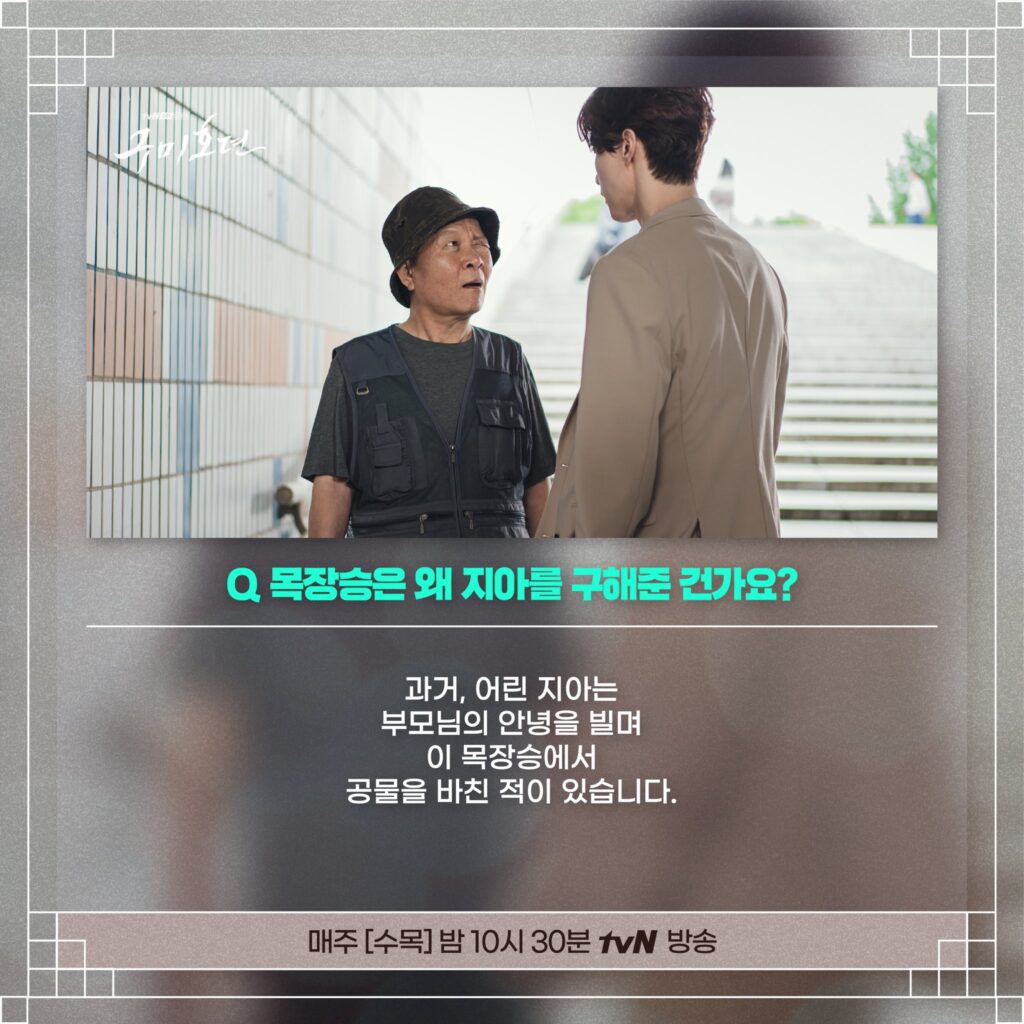
Q: Why did the Mokjangseung save Ji Ah?
In the past, a young Ji Ah had made an offering to this mokjangseung to pray for her parents’ safety.
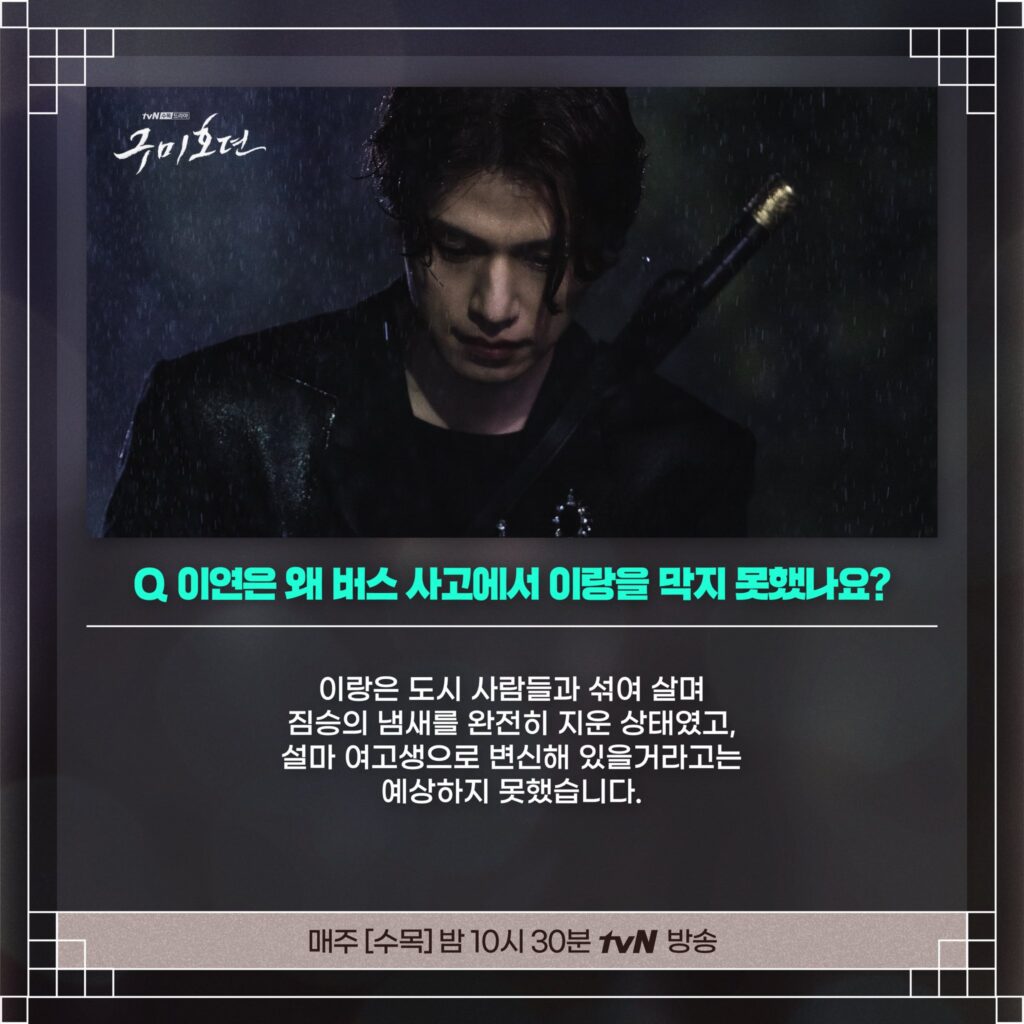
Q: Why wasn’t Lee Yeon able to prevent Lee Rang from causing the bus accident?
Lee Rang’s beast scent had been completely erased by his living in close proximity with humans, and Yeon didn’t anticipate that Rang would have possibly transformed himself into a high school girl.
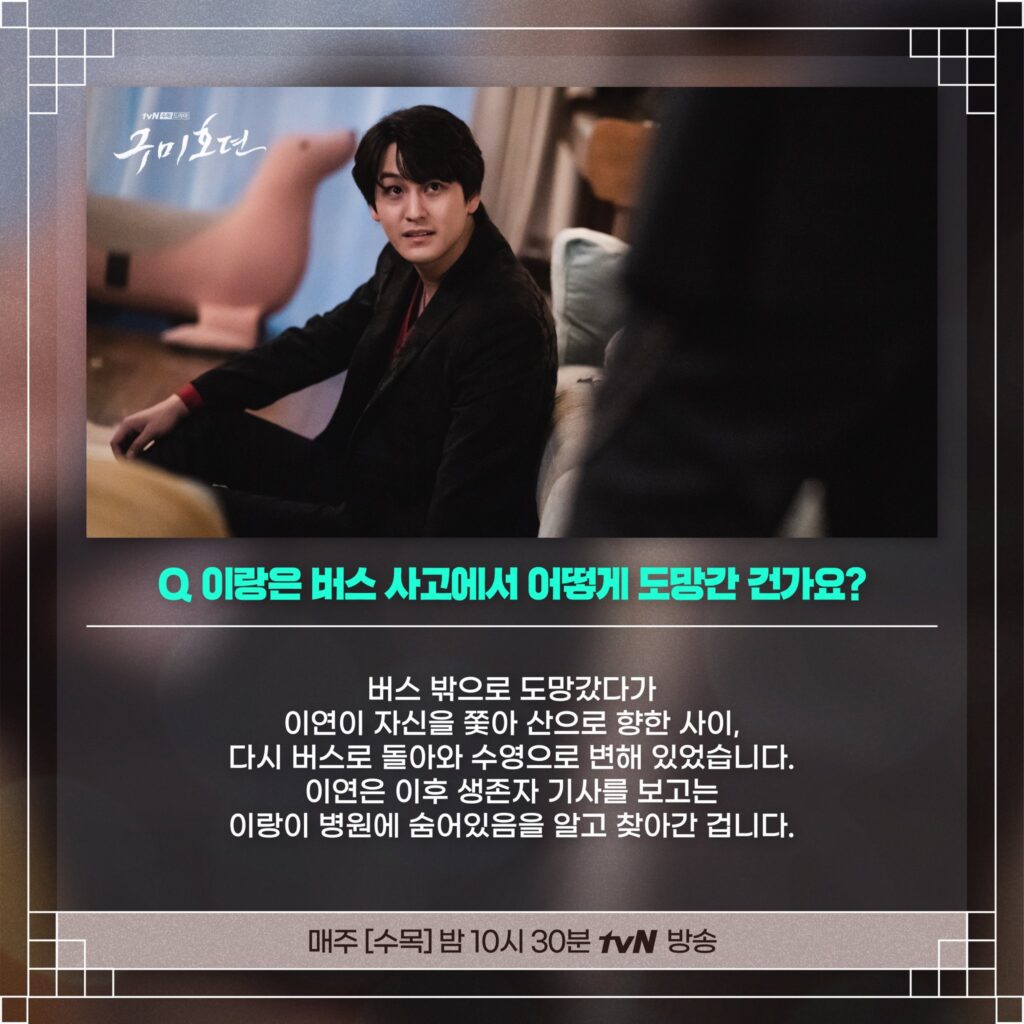
Q: How did Lee Rang escape the bus accident?
He escaped from the bus (to escape Yeon) and then, when Lee Yeon headed into the mountains in pursuit of him, Rang returned to the bus and disguised himself as Soo Young. Lee Yeon saw an article about a survivor afterward and, realizing Lee Rang was hiding at the hospital, went to find him.
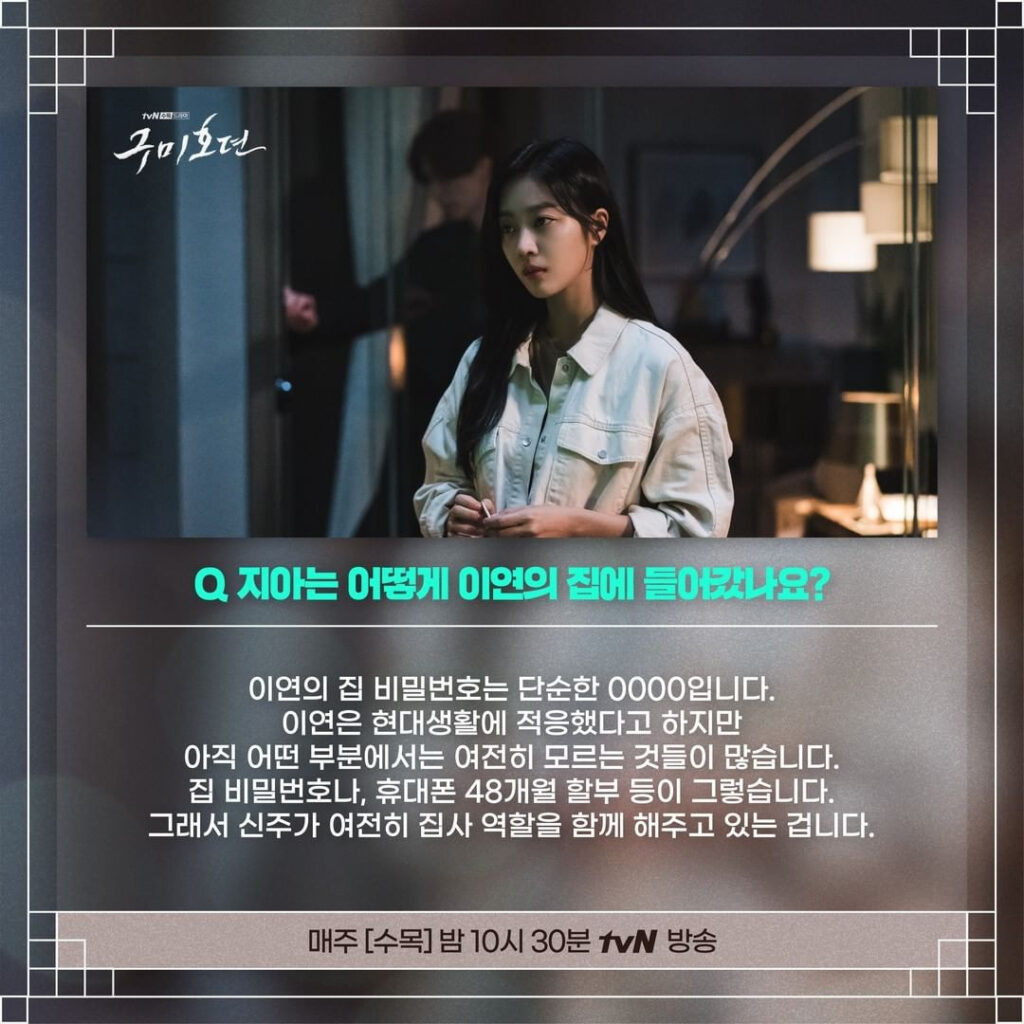
Q: How did Ji Ah get into Lee Yeon’s house?
Lee Yeon’s house code is a simple 0000. Lee Yeon says he’s adapted to modern society, but in some areas there are still many things he doesn’t know. Home security codes and 48-month mobile phone installment plans are among these. That is why Shin Joo continues to act as his butler for him.
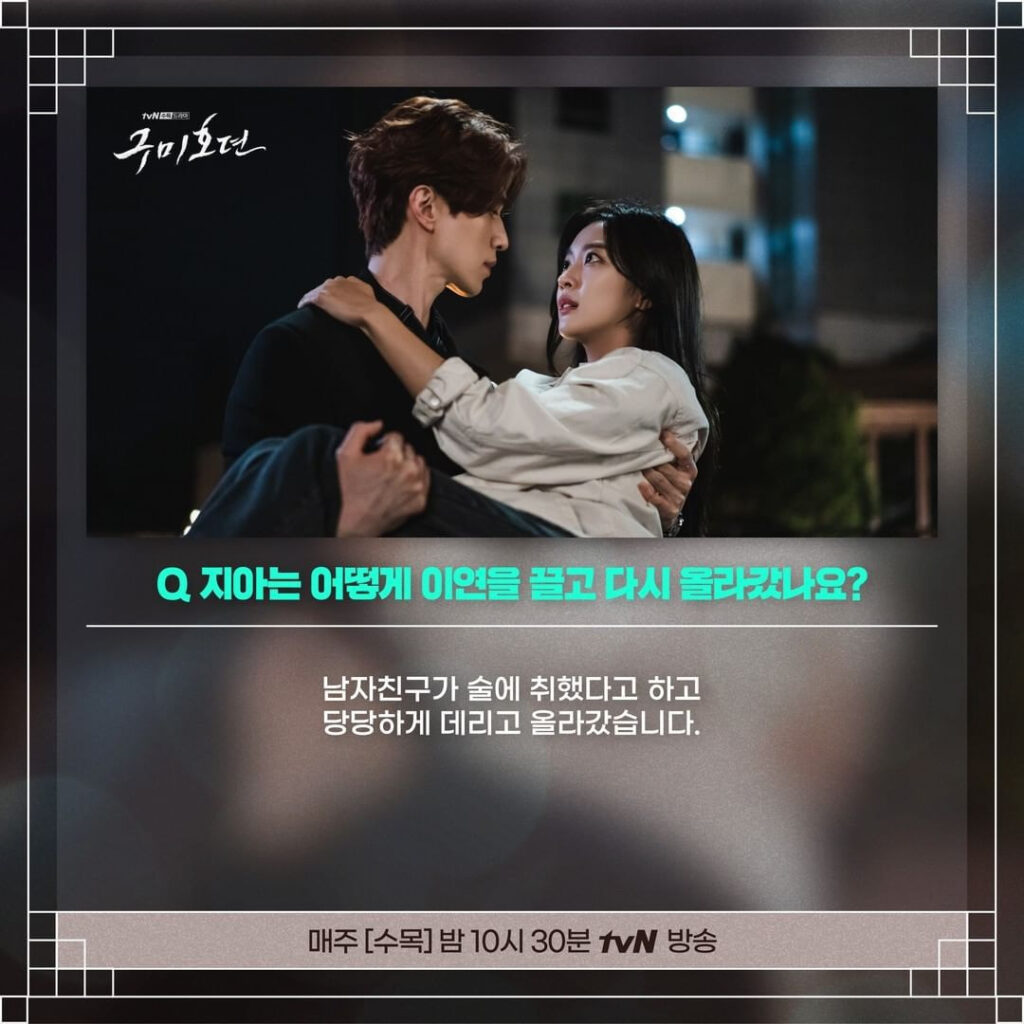
Q: How did Ji Ah drag Lee Yeon back up to his apartment?
She lied saying that her boyfriend was drunk and boldly took him back up (it’s implied right past the security desk hah).
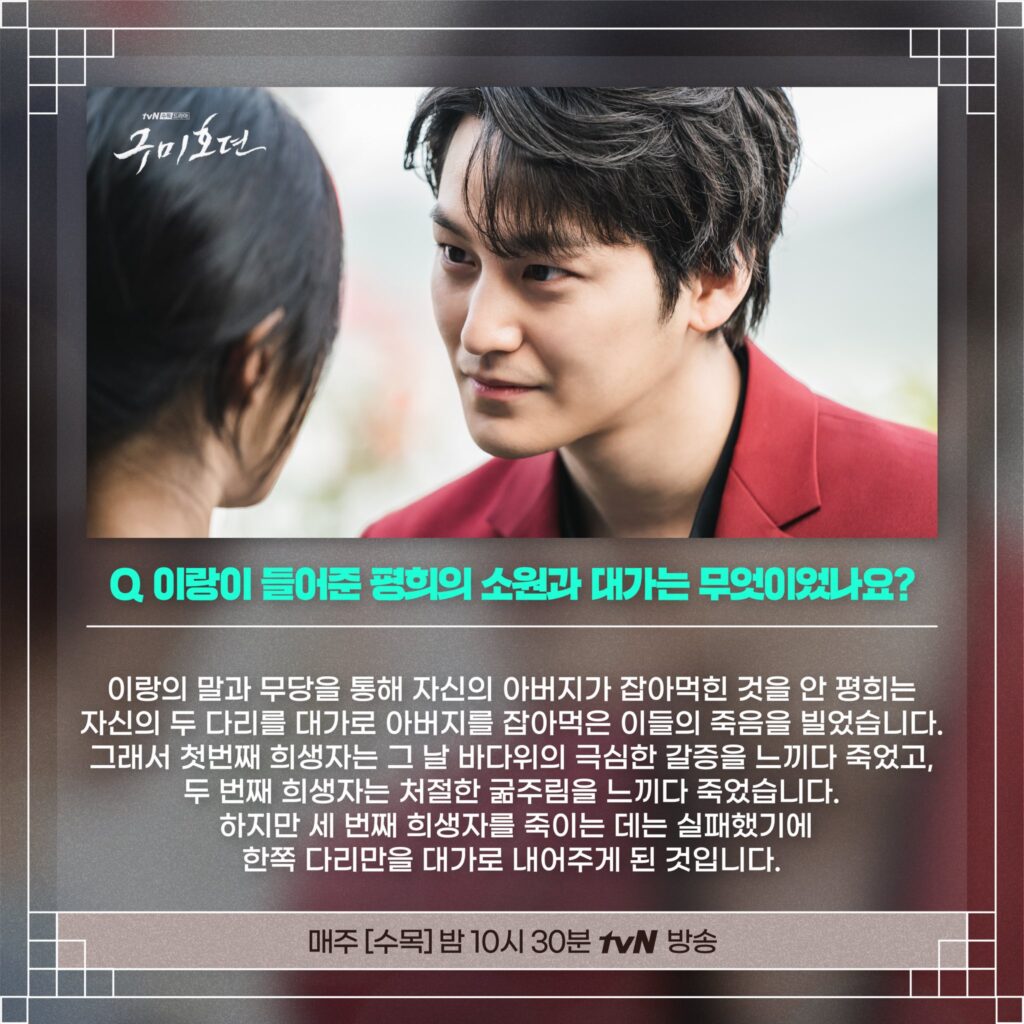
Q: What was Pyung Hee’s wish that Lee Rang granted and what price did she pay for it?
Pyung Hee, who learnt from Lee Rang’s words and from the mudang that her father had been eaten, offered up her own two legs in exchange for the deaths of those who had killed him. So, on the first day, the first victim died experiencing the intense dehydration they’d suffered while at sea and the second victim died experiencing the desperate hunger. However, as the curse failed to kill the third victim, Pyung Hee ended up only sacrificing one of her legs.
Q: “His body came before his head, your father!” What did the mudang’s words mean?
Pyung Hee’s father actually didn’t die during the shipwreck. The Eunhaho (Milky Way)’s crew, unable to hold out against their intense dehydration and hunger, turned on Pyung Hee’s father and ate him. That’s why the mudang said that, rather than Pyung Hee’s father’s head, which returned as a skull, his body that had been eaten returned to the land first (in the crew’s bellies – ugh, gross).
Q: How was Pyung Hee, alone (of the island’s inhabitants), safe?
Pyung Hee’s family was the only one in the village to have moved to the island from somewhere else.
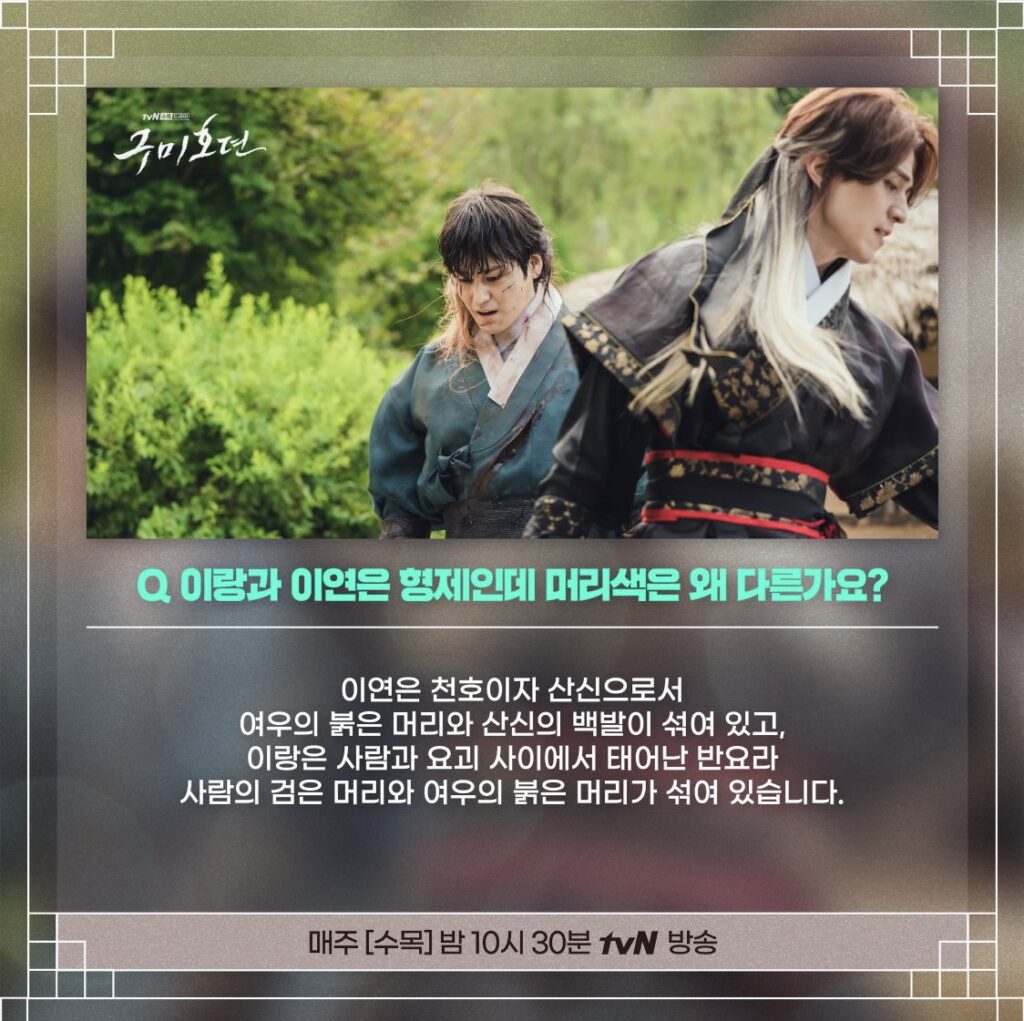
Q: Lee Rang and Lee Yeon are brothers so why do they have different hair colors?
Lee Yeon, as a cheonho and a mountain god, has a combination of a fox’s red hair and a mountain god’s white hair. Lee Rang is a half-demon* born between a human and a fox, so he has a combination of the black hair of a human and the red hair of a fox.
*n.b. The word used here is ‘banyo/hanyou’ (半妖), and really means something closer to ‘half-supernatural,’ though this is the standard translation.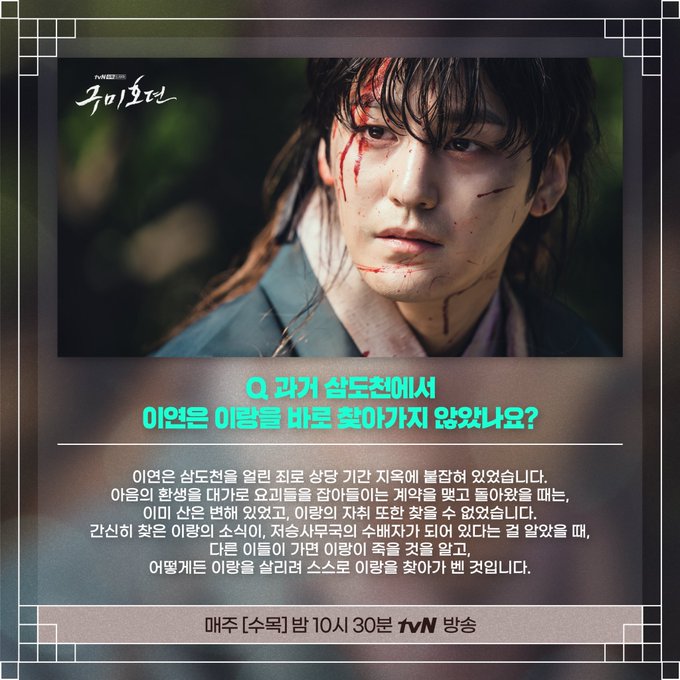
Q: In the past, did Lee Yeon not immediately search out Lee Rang after leaving the Samdocheon (River of Three Crossings)?
For the crime of freezing the Samdocheon, Yeon was held prisoner in hell for a considerable period of time. By the time he had signed the contract requiring him to hunt down monsters (yokwe/youkai) in exchange for Ah Eum’s reincarnation and returned, the mountain was already changed, and he could find no trace of Lee Rang. When he finally caught wind of Rang with great difficulty, it was to learn that his brother was a criminal wanted by the Afterlife Immigration Office. Knowing that if someone else were to be sent Lee Rang would die, Yeon decided to go after his brother himself in order to save Rang at any cost, and cut him down. (intentionally dealing him a non-lethal blow)
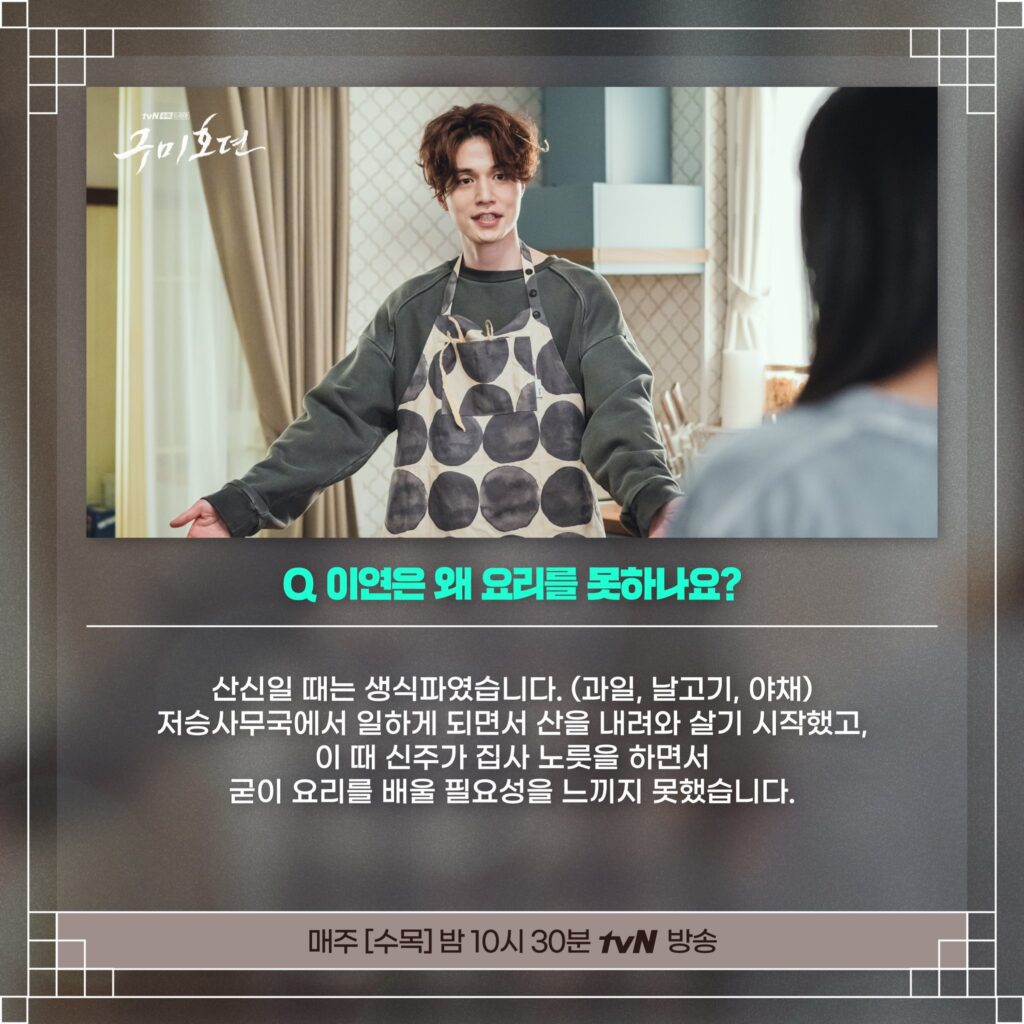
Q: Why can’t Lee Yeon cook?
When he was a mountain god, he subsisted on raw foods (fruit, raw meat, vegetables). Once he started work at the Afterlife Immigration Office he came down from his mountain and began to live (in the city/among people). From this time Shin Joo acted as his butler so Yeon never felt the need to learn.
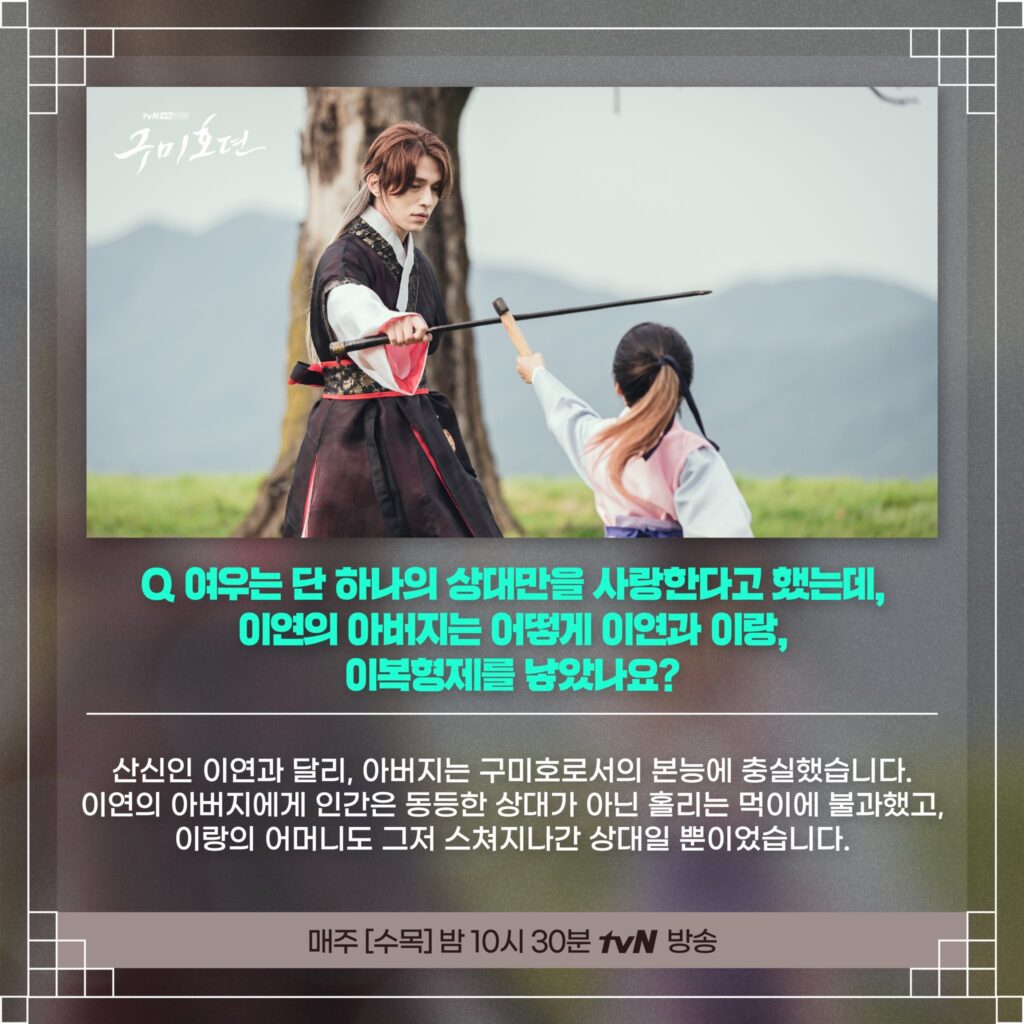
Q: They say that foxes only love their one and only partner, so how is it that Lee Yeon’s father issued two sons, Lee Yeon and Lee Rang, from different mothers?
Unlike Lee Yeon, who is a mountain god, Yeon’s father was true to his instincts as a gumiho. To Lee Yeon’s father, humans were not equals but rather mere prey to be lured, and so Lee Rang’s mother was nothing more than a passing dalliance.
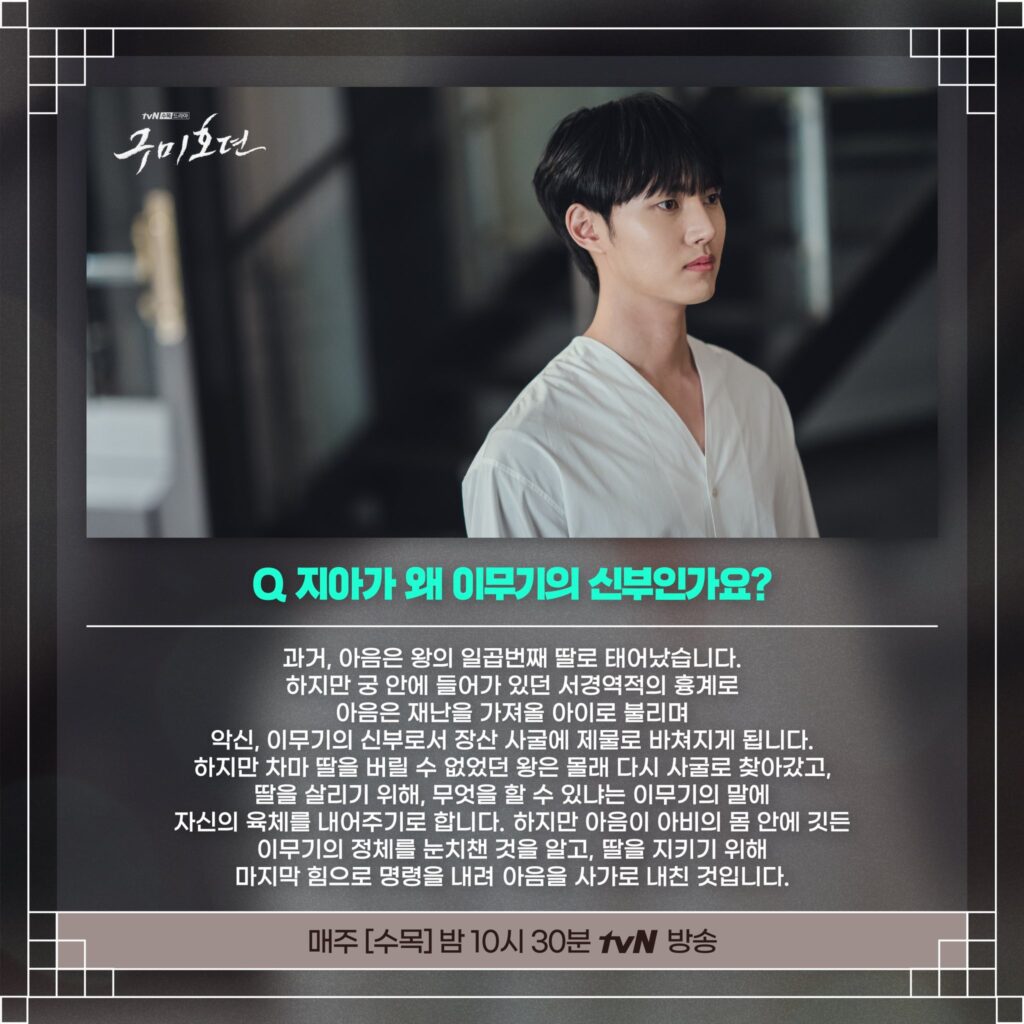
Q: Why is Ji Ah Imoogi’s bride?
In the past, Ah Eum was born as the king’s seventh daughter. However, due to the scheming of the Traitor (man with the traitor’s brand on his forehead) who had infiltrated the palace, Ah Eum came to be called a child who would bring calamity and was thus sacrificed to the evil god Imoogi in Jangsan Cave (the cave Ji Ah’s mom visited while she was pregnant with Ji Ah). The king, unable to stand by and send his daughter to be sacrificed, secretly returned to the cave. When Imoogi asked him what he would do to save his daughter, the king offered up his own body. However, realizing that Ah Eum had caught on to the fact that Imoogi had infiltrated her father’s body, the king used the last of his strength to issue an order exiling her to a private residence in order to protect her.
Image credit and permissions belong to tvN. You can find the original tvN images here and here.
All source materials belong to the parties to which they are licensed. All translations are our own.

